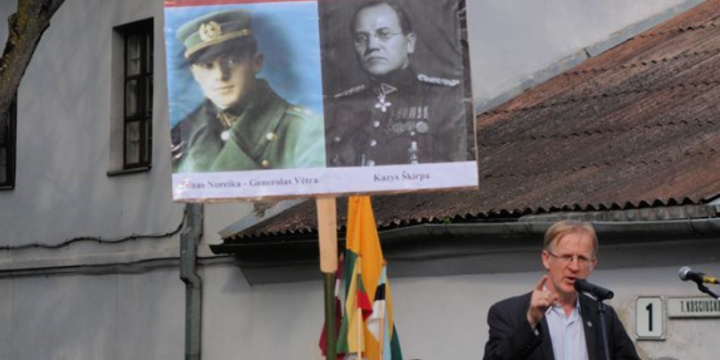2022/09: New Documentary Examines the Murder of Jews by Latvians and Lithuanians in the Holocaust
Baltic Truth - Trailer
Baltic Truth: Collaboration with Nazis in the Baltic States.
- Allgemeiner: The Lie Of The Century
September 12, 2022 – by Alan Zeitlin

Arūnas Bubnys of the state-sponsored Lithuanian Genocide Center speaking at a June 23, 2020 far right meeting flanked by the photographs of wartime Nazi collaborators Jonas Noreika and Kazys Škirpa. Photo: courtesy of ‘Defending History’.
In one scene from the powerful and horrific documentary “Baltic Truth,” Riga Ghetto survivor Marger Vesterman plays the piano to the tune of a song created in the ghetto. He then recalls what the words were: “If you survive, no one has to remind you that you have responsibilities.”
The chilling documentary reminds us that it was not only Nazis who massacred Jews. In this case, Latvians and Lithuanians were all too eager to quench their thirst for Jewish blood, even if it meant shooting neighbors who they’d previously celebrated birthdays with.
The searing documentary is narrated and hosted by Israeli singer Dudu Fisher. Fisher explains that his mother, Miriam, was born in Riga in 1932, and that if much of his family hadn’t moved to Mandatory Palestine, he would have been “among the millions of unborn Jewish children.”
On July 4, 1941, Riga’s Great Choral Synagogue was burnt down. Jews at the time thought massacres against their brethren in Poland were only rumors.
Because Latvia had been occupied by Russia in 1940, when it was occupied by Germany in 1941, Jews hoped the fury would be against the Bolsheviks. In the film, George D. Schwab explains that his father gave flowers to the German Army and greeted them and asked what would happen to the Jews. His father was told not to worry, as the main goal was to fight the Bolsheviks. Days later, his father had his eyes gouged out, he was tortured and then executed.
In the town of Akniste, Jewish men had their noses and ears cut off before they were shot to death.
At different times, Fisher chants the “maleh” — a prayer to honor the dead — and it is difficult not to cry when he does so. Outrageously, a number of Latvian and Lithuanians responsible for massacres against Jews have had monuments built in their honor.
Fisher notes that Jews were told they would be relocated, but many were relocated to their graves. And in some cases, Jews had to dig their own graves.
As to why regular citizens would participate in such atrocities, three theories are advanced: they wanted to loot and improve their economic situation, they were influenced by the Nazi ideology of scapegoating Jews or supported it themselves, or they believed propaganda that the Jews were all communists who supported the Russian takeover.
Survivor Elly Lasar Gotz says that on October 29, 1941, Lithuanians, supervised by Nazis, killed 10,000 Jews. We learn that by one forest, 25,000 Jews were killed in two days. Adults were killed with one bullet to the head, but so as not to waste bullets, children were killed by having the rifle butt being smashed against their heads.
Before the war in Lithuania, there were 400,000 Jews. But after World War II, there were only hundreds.
Viewers will become more and more enraged as the film goes on, but that is the point. “Baltic Truth” is a documentary you must see, as a participant to fight against those who seek to erase historical facts. If your blood hasn’t fully boiled, it will when you see that a murderer of Jews has been romanticized in a play that receives applause. Los Angeles resident Grant Gochin also notes that there are monuments in Lithuania for Juozas Kristaponis, who murdered Jews in Belarus, including relatives of the late Israeli leader Shimon Peres.
Gochin says in the film that if Lithuania is permitted to rewrite its history — as it is trying to do — then anyone can.
If Jew-killers can have monuments in their honor in Lithuania, then “why not create a monument in Central Berlin for Adolf Hitler?” he asks rhetorically. “Why not build a monument in New York for Osama Bin Laden?”
The answer to that, is that each of us must play a role in stopping it.
The American premiere of “Baltic Truth” will take place in Manhattan at The Stephen Wise Free Synagogue on September 14 at 7 p.m. A live concert with Dudu Fisher and Cantor Dan Singer and a talkback with the filmmakers will follow the screening.
Alan Zeitlin is a writer based in New York.